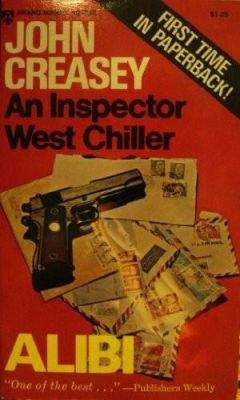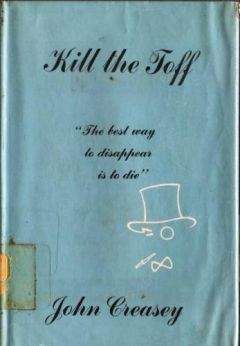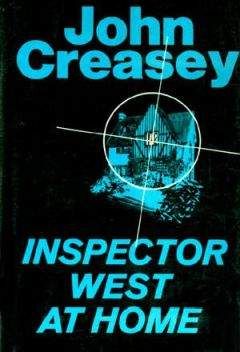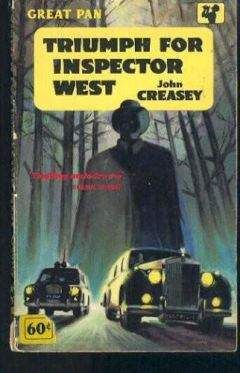John Creasey - Inspector West Alone
На сайте mybooks.club вы можете бесплатно читать книги онлайн без регистрации, включая John Creasey - Inspector West Alone. Жанр: Прочее издательство неизвестно,. Доступна полная версия книги с кратким содержанием для предварительного ознакомления, аннотацией (предисловием), рецензиями от других читателей и их экспертным мнением.
Кроме того, на сайте mybooks.club вы найдете множество новинок, которые стоит прочитать.
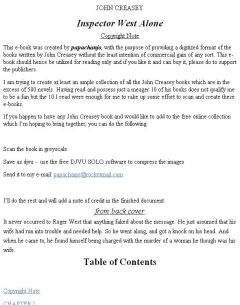
John Creasey - Inspector West Alone краткое содержание
Inspector West Alone читать онлайн бесплатно
Strangely, he felt easier in his mind.
She put an arm round his shoulders and her face was very close to his.
“Don’t worry,” she said very quietly. “Just go to sleep.”
“What—what time is it?”
“It’s the middle of the night. Don’t worry, just go to sleep. You won’t dream.”
* * * *
He didn’t dream.
* * * *
It was full daylight when he woke, and the sun was shining. He felt more rested and calmer than he had for three days—now nearly four. He lay for a while, looking at the sun shining into a corner of the room, then got up and went to look into the garden. The grass smiled, and the daffodils’ heads were raised; the scene was beautiful and as quiet as his mind. He didn’t ask himself whether he had succeeded in doing what he had set out to do. He knew that he had; and that although he might have to pretend again, this part of the ordeal would soon be over. Marion brought him his breakfast. The man with the white jacket and the mournful face shaved him.
Afterwards, Marion brought in a suit of clothes.
* * * *
Except for a handkerchief, there was nothing at all in the pockets, but Roger felt more himself, fully dressed. The clothes fitted well. He wasn’t allowed a tie, the shirt had a collar attached. He was brought a pair of leather slippers, but not shoes—and therefore no laces.
Marion allowed him twenty minutes to dress, and then came in. She left the door wide open. No one was in the narrow passage behind her. She looked fresh, with nothing to show that she had lost so much sleep during the night.
“Would you like to walk round the garden?”
“Er—may I?”
“Yes, it’s a glorious morning,” she said. “And afterwards you can sit downstairs for a while, a change will do you good. Did you sleep well after I left you?”
“Er—yes.”
“No dreams?”
“No.”
“I told you so,” she said; and she had.
He laughed inwardly, but was haunted by an uneasy feeling; she had prophesied it, and it had happened—her “cure” had worked.
The passage was narrow, with cream walls. There were four doors in it. It led to a landing and a narrow staircase, and he didn’t think that it was the front of the house. Downstairs, in a small hall, Marion took an overcoat from a peg and helped him on with it, slipped a coat over her shoulders like a cloak, and then opened the door. The sun shone brightly on them, warm and spring-like. It was good to breathe fresh air.
A bent old man approached a herbaceous border, but quickly disappeared. The beech-hedge was higher than it had seemed from the window—seven or eight feet high, and it looked thick; it wouldn’t be easy to get through or over that hedge. As they walked, Marion talked idly about trivial things.
At the end of the garden Roger stood and looked at the house.
There was nothing remarkable about it. The walls were grey, most of the windows small—only those on the ground floor appeared to open. Radio music came from one of the rooms. He guessed she didn’t want him to study the house closely, and she pressed his arm gently. He turned— and as he did so, a man appeared at a ground-floor window.
He knew it was the man who had talked to him after the hold-up. Even at this distance, those silvery-steely eyes were unmistakable.
CHAPTER VII
NEWSPAPERS
THE man withdrew, as if anxious not to be seen.
Roger kept his face blank, let his gaze roam past the window towards the daffodils near it. He knew that Marion was looking at him intently, but he wouldn’t meet her eyes. She held his arm lightly and exerted a gentle pressure as they moved on.
“What is the matter?”
“I’m all right.”
“You must learn to tell me exactly what passes through your mind when you’re frightened.”
“I’m not frightened.”
“You are,” she said, and he couldn’t look away from her any longer, had to meet her eyes. They were so clear and grey—restful eyes. “I felt your arm go taut. Unless you talk freely, you won’t get better,” she said. She hadn’t talked so openly before about his being ill. “Why don’t you trust me?”
“You’ve been very good.”
“I want to help, that’s all, and I think I can.”
“How many other patients have you had here?”
“Quite a lot. I’ve been able to help some of them, and I’m very anxious to help you.”
“Why don’t you tell me what’s the matter with me, instead of hinting?”
“Don’t you know what’s the matter?”
“No.” He tightened his lips. “I’m as sane as you are. I want to leave here.”
“You may, as soon as you’re well.”
He pulled his arm free and stalked ahead of her, and she made no attempt to catch him up. The gardener went on working and showed no interest in him, behaving as if this were an everyday affair. He walked across the lawn glancing towards the window where he had seen the man with the fierce silvery eyes, but without staring. He caught a glimpse of the man, standing by the side of the window with a hand at the curtains.
He turned, and saw that Marion was walking slowly across the lawn. The sun shone on her hair, filling it with golden lights, giving her beauty. He waited for her, feeling —and looking—like a sulky schoolboy. She made no reference to what they had been saying.
“I expect you’re tired, you’d better come indoors.”
“I’m all right out here.”
“It’s the first time you’ve been out for several days, you shouldn’t overdo it,” she said. She took his arm again and drew him towards the side entrance to the house. This time there was no doubt; she pressed gently against him. He went into the house, which seemed gloomy after the bright sunlight, and she led the way to a door on the right —overlooking the back garden. Was it the room where the man had been?
It was large, pleasant, sunlit—a drawing-room, furnished with the same taste as his bedroom. In one corner, near the window, was a grand piano, and on it a huge bowl of daffodils and early tulips. Freshness seemed to come from them. There were several sofas and easy-chairs, the carpet was pale green and yellow, on the cream-papered walls were water-colours—good ones. She led him to a chair and waited for him to sit down, pulled up a small table on which was a box of cigarettes and a table lighter. She offered him a cigarette.
“Thanks.”
“Just sit here for a while. I’ll see you again soon.”
She left him with the lighter—the beginning of trust. The door closed softly behind her. He fought back a temptation to jump up and follow her, and as he began to sit down, saw the newspapers.
The sight had a curious physical effect. He stared at them—at this first contact with the real world in four days. The papers were in a rack, near the piano, with several magazines. He went across and picked them up. Before he did so, he thought: “It’s a trick.” They would be old newspapers, of no real interest.
They weren’t; there were four, each a Daily Cry. The first dated March 14, the day he had left the Yard. He looked at the others; March 15, 16, and 17. He looked at the second, and the headline leapt up at him:
GIRL MURDERED IN LONELY COTTAGE.
The body of an unknown girl, her face savagely mutilated, was found by the police in Copse Cottage, Helsham, one of the loneliest parts of Surrey. The killer had smashed a window in order to force entry, and broken down the door of the girl’s room with an axe.
There was a great deal more, but nothing about Roger or the hold-up. He dropped the paper and picked up the next.
GANG RESCUES KILLER—
POLICEMAN SAVAGELY ATTACKED
There was the whole story; much more than there had been in the first paper. He scanned it swiftly, for names. The man who had been charged was “believed to be Arthur King, with an address at Kingston-on-Thames”; there was nothing about Roger West. He glanced through the rest of the paper quickly, seeking only headlines, and found what he wanted on an inside page—a short paragraph with a small heading: Yard Man Missing.
Chief Inspector Roger “Handsome” West, youngest C.I. at Scotland Yard, left his office late on Monday afternoon, and has not been seen or heard of since. The Yard authorities believe that West, who has been working at high pressure for several months, may be suffering from loss of memory or some other illness.
POLICE HUNT MURDER GANG
There was much more behind that; he could see the wary hand of the Yard, requesting the newspapers to play down the fact that he was missing. There was no photograph, nothing to suggest a hue and cry, nothing to hint that his disappearance might be in any way connected with the murder. He picked up the fourth paper—that morning’s.
Everywhere in Great Britain the police are seeking the gang which rescued a killer from a police guard near Helsham, Surrey, late on Monday night. It is believed that an arrest will shortly be made. The rescue, described fully in yesterday’s Cry, was the most daring in police annals.
The dead girl has not yet been identified. There was nothing at the house where she was found to suggest that she lived there, and the house has been empty for several months, the owner, Mrs. Ethel Malloy, being abroad. The police theory is that the murderer made an appointment with the unknown girl who discovered his evil intentions too late and locked herself in. Her face was so badly mutilated that photographs cannot help with identification.
Sir Harry Gregg, chief pathologist at Scotland Yard, says that the girl was probably in the early twenties, but there were no distinguishing marks on the body. The police are anxious to have details of any young woman who has been missing from her home since Monday last, and who answers the following general description: Height: 5 ft. 6 in.; medium to dark hair; blue eyes; well-developed; Weight: 10 stone 4 lb. At the time of her death, the victim was wearing a pleated black-serge skirt, white-silk blouse with four mother-of-pearl buttons the size of two-shilling pieces, a three-quarter-length coat to match the skirt, nylon stockings size 9½ (French make), black suede shoes, rayon underwear (peach colour). The names of the suppliers and manufacturers of all these articles of clothing had been removed.
* * * *
Roger groped for another cigarette and lit it without thinking of that token of trust—he was left with a lighter. There was plenty to go on; absence of name tags shouldn’t prevent the police from tracing the clothes. The “French make” introduced a difficulty; was it possible that the girl had come from France? No more than an outside possibility.
He was thinking almost as if he were at his office. He turned the pages, and again found what he wanted— another reference to himself, this time with a small photograph; and a poor one.
YARD MAN STILL MISSING
Chief Inspector West (photo side) still missing from the Yard and from his home in Bell Street, Chelsea. There has been no trace of his movements since he left the Yard late on Monday afternoon to keep an appointment with his wife. The police theory that he is suffering from loss of memory is supported by his wife, who says that the pressure of work for the past few years has affected his health.
Nonsense! Janet knew better. Janet had been visited by the pundits, had been told what to say to the Press—and the pundits were still influencing the Press. There was not a hint that he was even remotely connected with the Copse Cottage murder. Janet, by now, would be in agony of mind.
* * * *
So mystery was piled upon mystery. The dead girl was unknown, which meant that the Yard wasn’t getting far in its inquiries. That was trivial, compared with the greater mystery—what did these people think they were going to do with him? Why had they brought him here, why had they identified him with Arthur King, and then talked so plainly during the rescue that the police must realize that he was in fact West? Why had they treated him like this, as if trying to convince him that he was ill, in need of treatment—that his mind was unbalanced ?
What good was he to anyone if the Yard had reason to believe him to be a killer? He lit another cigarette.
He stood up and went to the window, looking into the garden, and then saw that this window was exactly the same as the one upstairs—of toughened glass, and without a movable frame.
He turned from the window and picked up the newspapers again—and then he heard a sound behind him. It made him swing round. A shutter was falling over the window from the outside, a shutter like a Venetian blind, blotting out the sun from the top half of the window, then descending over the bottom half. When the shutter was nearly down he rushed to the window and touched the glass, but there was nothing he could do. All he could see was a little of the lawn and the heads of a few daffodils; they disappeared when the shutter fell right into position, and he was left in absolute darkness. Only the glowing tip of his cigarette relieved it, and that faded when he stopped drawing at it.
He heard no sound, now—just stood with his back to the window, staring into darkness.
He heard a whirring noise, which came suddenly, and turned his head to the right. Then he saw light—a beam, as from a powerful torch, shining on the opposite wall. There, the wall was bare. The light hit the wall, much like that from a cine-camera and about the same shape; it made an oblong of light, two yards across, a yard and a half down. Yes, it was from a small projector, and the whirring was explained, they were going to put on a film. He forced himself to walk slowly to a chair facing the wall: he could just pick it out, among the other furniture. He sat down and crossed his legs.
A picture appeared.
A girl was walking along a narrow street—that was all. He didn’t recognize the street, but there were things in it which told him that it wasn’t in England; more likely, France. The terraced houses were tall, and the windows had shutters fastened back against the walls. There were several little balconies at the higher windows. The street was empty, except for the girl, who appeared to be walking towards him. She looked tall. She walked quickly. She was smartly dressed and seemed thoughtful. In a way, she wasn’t unlike Marion; but he might also say that she wasn’t unlike Janet. She kept on walking—was the street as long as that, or was it a trick of the camera ?
She turned into another street where there were more people, into yet a third. This was a wide busy thorough-fare. He caught a glimpse of a single-decker bus with a crowd of people standing on the platform at the back— peculiar to Paris.
The dead girl had worn French nylons.
He had forgotten that sharp nervous fear of the sudden darkness, was absorbed in the pictures.
The girl was lost among the crowds; no, not quite lost, she appeared occasionally, once stood and looked into a shop window—at handbags. Then she walked on—and there was a cut in the film.
Another picture came, this time of a small cafe, with a big striped awning over a dozen or so small tables, a waiter standing in white jacket by the open door, one couple drinking out of long glasses. Then the girl appeared and sat down as far as she could get from the couple. The waiter approached her; she shook her head, said something, indicated that she was waiting for a companion. The waiter took up his position in the doorway. The girl lit a cigarette, adjusted her long skirt, looked up and down the street. Twice she glanced at her wrist-watch. She began to frown.
Похожие книги на "Inspector West Alone", John Creasey
John Creasey читать все книги автора по порядку
John Creasey - все книги автора в одном месте читать по порядку полные версии на сайте онлайн библиотеки mybooks.club.
